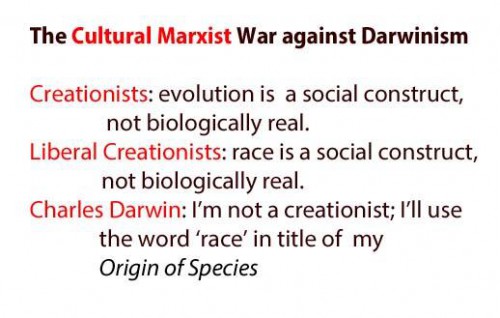It’s kind of an irresistible target.
A few things that I mention:
The evolutionary psychology FAQ at UCSB
(Warning: it’s a sad, ugly, long document, but worth perusing if you want ammunition against evolutionary psychology.)
Chapter 7 of Darwin’s Descent of Man
(Warning: it’ll be a shock if you haven’t read 19th century literature in scientific racism before. Darwin held all the biases of his time.)
The critical points:
Evolution is more than just selection, and includes mutation, recombination, and drift.
Natural selection has a cost; it puts an upper bound on the number of elements subject to selection.
Populations have a substantial amount of genetic variation.
Most of that variation is neutral, or nearly neutral.
Mutations that have a small effect are invisible to selection.


